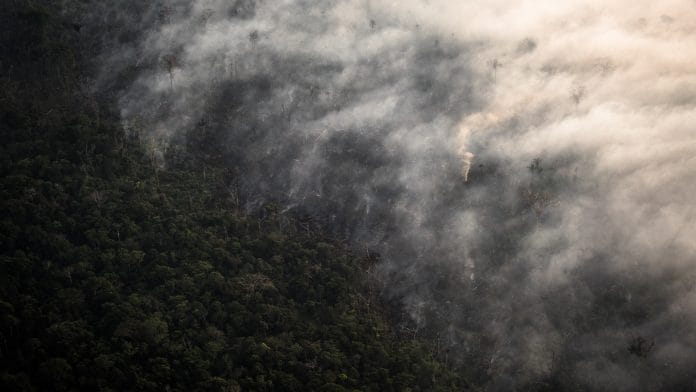Rising CO2 emissions could affect decision-making in humans
Researchers at the University of Colorado at Boulder have suggested that rising carbon dioxide (CO2) levels could eventually alter basic decision-making skills in humans. Due to fossil-fuel production, agriculture and other human activities, carbon dioxide in the atmosphere has increased exponentially. In 2019, the global average for CO2 in the atmosphere was a record 414 parts per million. More on ZME Science.
NASA celebrates Hubble birthday with its stunning space capture
The Hubble Space Telescope celebrated its 30th anniversary Friday, and to mark the occasion, NASA released a stunning image called the Cosmic Reef, which was beamed back by the telescope. The image features the red nebula NGC 2014 and a smaller blue nebula called NGC 2020. A nebula is a giant cloud of dust and clouds in space, and some nebulae are regions where new stars are formed. The red nebula contains stars that our 10 to 20 times more massive than the sun, while the blue one contains a single star that is 2,00,000 times brighter than the Sun. The nebulae are 1,63,000 light years away. More on Space.com.

Researchers trace evolution of bird brain
An international team of evolutionary biologists and paleontologists have reconstructed the evolution of the avian brain using a huge dataset of brain volumes from dinosaurs, extinct birds, reptiles and modern birds. The researchers discovered that two groups of birds with large brains and high intelligence evolved very recently — parrots and corvids (crow family). These two groups outpaced other birds to evolve larger-than-average brain size rapidly and showed tremendous cognitive capacity, including the ability to use tools and remember human faces. More on Phys.org.
Insect population has shrunk 27% in 30 years
The Earth has lost more than 25 per cent of its insect population in the past 30 years, according to an international team of researchers. Insects are crucial to the world’s food supply as pollinators, and their rapid decline is set to have devastating and alarming consequences across the globe. The loss has been linked to urbanisation and a loss of habitat. More on Time.
Also read: A trove of Viking-era artefacts and an ocean creature that may be the world’s largest animal







@Raj… Spot on. The Western governments fleeced the eastern countries in the name on greenhouse etc. Their theory can be questioned because a big hole opened up in the ozone layer in the Arctic 45days after the covid lockdowns brought the industries and vehicular traffic to a stop.
These bogus organisations and individuals should were living in absolute luxury .. the funding should be stopped.
The school dropouts like Greta thurnburg should be sent back to school.
It is extremely important for us humans as a species to think ahead of our present problems. Instea dof economics I believe we have to preserve the habitat for our dutire generation. Many things leads to under development of a human brain in early age. Carbon dioxide is one of them. Poverty is other and many other polllutant not just affect the brain but also alter the genetic information of our cells for intance PFOA which was used for teflon production. We have to give priority to these information above all else. Economy can grow with conditions. If it’s too late to recover then it will be end of our legacy. Most of us are constantly trying to justify the actions of corporations which seeks profit over anything. It is highly unethical to let the future generation rot in a bio prison which we created.
We are not stupid anymore to trust global warming and CO2.. world is waking up to these funded programs which spew nothing but misinformation with a clout to charge for carbon emissions